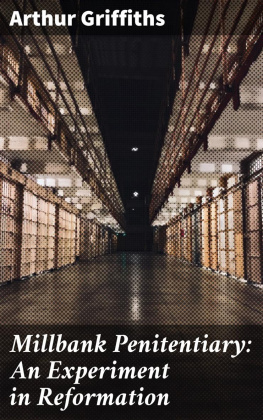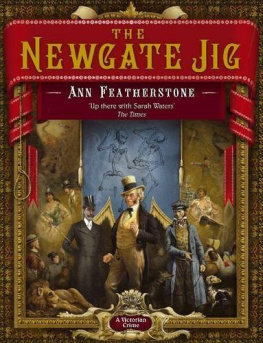The gaol of Newgate may be taken as the type of all the early prisons, the physical expression of manifold neglect and mismanagement from the thirteenth century down to our own times. The case of all prisoners in England was desperate, their sufferings heartrending, their treatment an indelible disgrace to a nation claiming to be civilized. The place of durance was sometimes underground, a dungeon, or subterranean cellar, into which the prisoners were lowered, to fight with rats for the meagre pittance of food thrown to them through a trap-door. These terrible oubliettes were too often damp and noisome, half a foot deep in water, or with an open sewer running through the centre of the floor. They had no chimneys, no fire-place, no barrack beds; the wretched inmates huddled together for warmth upon heaps of filthy rags or bundles of rotten straw reeking with foul exhalations. There was not the slightest attempt at ventilation, as we understand the word. The windows, when they existed, were seldom if ever opened, nor the doors; the spaces within the prison walls were generally too limited to allow of daily exercise, and the prisoners were thus kept continuously under lock and key. Water, another necessary of life, was doled out in the scantiest quantities, too small for proper ablutions or cleansing purposes, and hardly sufficient to assuage thirst. John Howard, the great philanthropist, tells us of one prison where the daily allowance of water was only three pints per head, and even this was dependent upon the good will of the keepers, who brought it or not, as they felt disposed. At another prison, water could only be had on payment, the price being a halfpenny for three gallons.
The rations of food were equally meagre. In some prisons almost nothing was given; in others, the prisoners subsisted on water-soup"bread boiled in mere water." The poor debtors were the worst off. For the felon, thief, murderer, or highwayman there was a grant either in money or in kinda pennyworth of bread per diem, or a shilling's worth per week, or a certain weight of bread: but the debtors, who formed three-fourths of the permanent prison population, and whose liabilities on an average did not exceed ten or fifteen pounds a piece, were almost starved to death. The bequests of charitable people, especially intended for their support, were devoted to other uses; creditors seldom if ever paid the "groat," or fourpence per diem for the subsistence of their imprisoned debtors required by the Act. Any alms collected within the prison by direct mendicancy were commonly intercepted by the ruffians who ruled the roost. When gaolers applied to the magistrates for food for the debtors the answer was, "Let them work or starve;" yet work was forbidden, lest the tools they used might fall into the hands of criminal prisoners, and furnish means of escape. At Exeter the prisoners were marched about the city soliciting charity in the streets. One Christmas-tide, so Howard says, the person who conducted them broke open the alms-box and absconded with the contents. The debtors' ward in this gaol was called the "shew," because the debtors begged by letting down a shoe from the window.
Prison buildings were mostly inconvenient, ill-planned, and but little adapted for the purposes of incarceration. Many of them were ancient strongholdsthe gate of some fortified city, the keep or castle or embattled residence of a great personage. Some lords, spiritual and temporal, with peculiar powers in their own districts, once had their prisons, so to speak, under their own roof. Their prisons lingered long after the power lapsed, and in Howard's time many of the worst prisons were the private property of individuals, who protected the keepers, their lessees, and pocketed the gains wrung from the wretched lodgers. The Duke of Portland was the proprietor of Chesterfield gaol, which consisted of one room with a cellar under it. For this accommodation, and the privilege it conferred upon him of demanding gaol fees, the keeper paid the Duke an annual rent of eighteen guineas. "The cellar," Howard says, "had not been cleaned for months, nor the prison door opened for several weeks." Another disgraceful prison was that owned by the Bishop of Ely. One bishop had been compelled to rebuild it in part fourteen years before Howard's visit, but it was still bad. It had been so insecure that the keeper resorted to a most cruel contrivance in order to ensure safe custody. Prisoners were chained down upon their backs upon a floor, across which were several iron bars, with an iron collar with spikes about their necks, and a heavy iron bar over their legs. This barbarous treatment formed the subject of a special petition to the king, supported by a drawing, "with which His Majesty was much affected, and gave immediate orders for a proper inquiry and redress."
Loading prisoners with irons was very generally practised, although its legality was questioned even then. Lord Coke gave his opinion against the oppression. Bracton affirmed that a sentence condemning a man to be confined in irons was illegal, and in "Blackstone Commentaries" is this passage: "The law will not justify jailers in fettering a prisoner unless when he is unruly, or has attempted an escape." In 1728 the judges reprimanded the warders of the Fleet prison, and declared that a jailer could not answer the ironing of a man before he was found guilty of a crime. When a keeper pleaded necessity for safe custody to Lord Chief Justice King, the judge bade him "build higher his prison walls." As Buxton observes, the neglect of this legal precaution was no excuse for the infliction of an illegal punishment. Prisoners should not suffer because authorities neglect their duty. "Very rarely is a man ironed for his own misdeeds, but frequently for those of others; traditional irons on his person are cheaper than additional elevation to the walls. Thus we cover our own negligence by increased severity to our captives."
The irons were so heavy that walking and even lying down to sleep was difficult and painful. In some county gaols women did not escape this severity, Howard tells us, but London was more humane. In the London prisons the custom of ironing even the untried males was long and firmly established. An interesting letter is extant from John Wilkes, dated 1771, the year of his shrievalty to the keeper of Newgate, Mr. Akerman. This letter expresses satisfaction with his general conduct, and admits his humanity to the unhappy persons under his care. But Wilkes takes strong exceptions to the practice of keeping the prisoners in irons at the time of arraignment and trial, which he conceives to be alike repugnant to the laws of England and humanity.
"Every person at so critical a moment ought to be without any bodily pain or restraint, that the mind may be perfectly free to deliberate on its most interesting and awful concerns, in so alarming a situation. It is cruelty to aggravate the feelings of the unhappy in such a state of distraction, and injustice to deprive them of any means for the defence of supposed innocence by calling off the attention by bodily torture at the great moment when the full exertion of every faculty is most wanting. No man in England ought to be obliged to plead while in chains; we therefore are determined to abolish the present illegal and inhuman practice, and we direct you to take off the irons before any prisoner is sent to the bar either for arraignment or trial."





